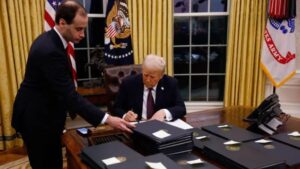In a historic and controversial move, the United States has formally announced its withdrawal from the United Nations, citing grievances over sovereignty, financial obligations, and perceived inefficiencies within the organization. The decision, endorsed by President Donald J. Trump and supported by key allies in his administration, marks a significant shift in U.S. foreign policy with global repercussions.
President Trump described the U.N. as “an organization that no longer serves the interests of the American people,” while Secretary of State Mike Pompeo argued that the institution has failed to address major global challenges effectively and has often worked against U.S. interests. National Security Advisor John Bolton, a longtime critic of the U.N., was instrumental in shaping the decision, emphasizing the need to prioritize U.S. sovereignty and bilateral alliances over multilateral diplomacy.
The U.S., which contributes a substantial portion of the U.N.’s regular and peacekeeping budgets, is expected to leave significant funding gaps that could jeopardize humanitarian aid, peacekeeping missions, and climate initiatives. Critics warn that this decision may open the door for nations like China and Russia to exert greater influence within the U.N., potentially reshaping the balance of power. Former U.S. Ambassador to the U.N. Samantha Power called the withdrawal “a self-inflicted wound that undermines American leadership on the world stage.”
The international community has reacted with dismay. U.N. Secretary-General António Guterres expressed regret, emphasizing that global challenges require collective action. European leaders, including French President Emmanuel Macron and German Chancellor Angela Merkel, have criticized the move, warning of its destabilizing effects on global cooperation.
Domestically, the decision has drawn sharp divisions. While conservative groups have praised it as a bold stance against global overreach, Democratic lawmakers have condemned it as reckless and damaging to U.S. credibility. As the U.S. begins its withdrawal, the world watches with uncertainty, questioning the future of multilateralism and the role of a nation that once championed global unity.
